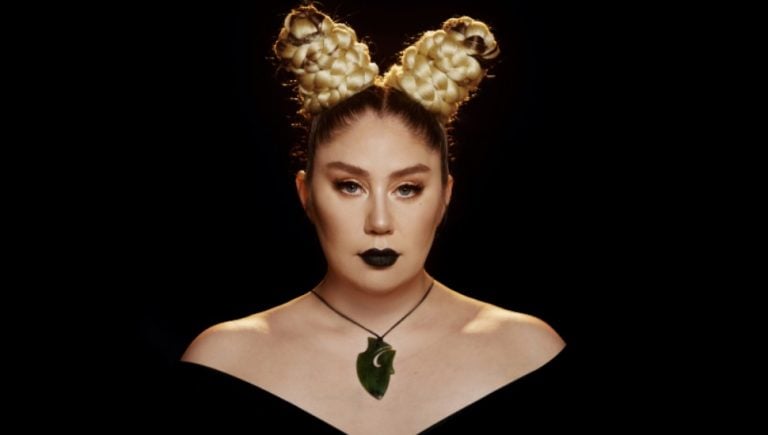We’re excited to announce that the next artist to be announced as part of Apple Music’s Up Next Local series is none other than TE KAAHU.
Apple Music’s Up Next Local series is dedicated to identifying and showcasing rising talent across Australia and New Zealand, hand-picked by Apple Music editors from around the world.
TE KAAHU is actually the Māori language project of artist, Theia) and her angelic voice is the latest to be added to the Up Next playlist in Australia and New Zealand and in addition will also be featured across playlists including NMD, Today’s Acoustic, Worldwide Chill and Waiata Anthems – an Apple Music playlist which is set to champion Māori music.
We were lucky enough to chat to TE KAAHU on the power of singing in reo Māori and much more.
What is one thing that has helped keep you going during this global pandemic?
It’s hard not to let the weight of all the ‘negative news’ get you down, so going on regular walks to get fresh air and just stepping away from social media or devices for a bit has been the best thing for me.
Also acknowledging that not every day is going to be productive, especially when you’re a musician and you’re shut inside your tiny apartment without access to all the normal things you normally need to create.
Love Music?
Get your daily dose of metal, rock, indie, pop, and everything else in between.
But on those days when you are productive – celebrate your achievements.
Take us through how you developed your music style?
I’ve always made music that was a bit outside the box – left of centre, I guess. The more my music began to take off; the more doors began to open, and interestingly my sound started to gravitate more towards the mainstream.
Without even knowing it at the time, I think I was trying to please people or make songs that my label would be happy about because they were “radio-friendly”. Then, I had a bit an epiphany, midway through my second Theia EP – I wasn’t really pleasing anyone, let alone myself.
So I reverted back to where I felt comfortable; and along came my 99% Angel mixtape, which people warned would not be “commercially viable”. Some people would say “that’s mad” because yes, when you make a record like that, all those doors that once opened for you, start to close.
But for me, it was liberating. I no longer cared what people thought. I think it was this that enabled me to create my reo Māori project TE KAAHU. There is no pressure to adhere to a certain sound or style with the songs I write for TE KAAHU. They are written straight from the heart.
Equally, the new Theia stuff that I’m about to start releasing is the same – it’s exactly as I want it to be. People will love it or hate it, and I have no control over that. I only know that I’m in a much happier and in a more creative space than I’ve ever been in.
What do you see as your secret weapon when it comes to your music?
Honestly, I think all of the above is a secret weapon. I see so many people caught in this trap of trying to ‘write a hit and be the next big thing’ but they’re not necessarily enjoying the journey. To not care what others think about your music and to just trust your instinct is a powerful weapon.
For my songs in English (Theia), it also helps that I have plenty of feelings to express so my treasure chest of lyrics never runs dry. For my songs in reo Māori (TE KAAHU), I channel my ancestors (ngōku tūpuna). They are my secret weapon.
Tell us about your latest single; how it started, what it’s about, and anything else you’d like to share about it.
‘Rangirara’ is the latest waiata (released as TE KAAHU). It takes its name from my grandmother, Rangirara. But also in reo Māori, ‘rangirara’ means beyond the heavens and in this song I’ve used lots of metaphors referencing the sky, thunder and its manifestations.
This song started with an idea, where I wanted to make something layered in harmonies, with a vibe that harked back to the kinds of waiata that were around when my grandmother was young. I imagined it being a waiata (song) she would’ve danced and sung to.
What are five attributes you think an artist needs to have in order to have career longevity in this music industry?
• Tenacity. I’ve had a lot of hard knocks along the way and moments where I could easily have walked way, but my manager and I have a motto and it is “never give up”. If you believe in something and you truly know what you are creating is worth being heard, then fight for it.
• Strength. Music is hard. Not so much making the music but the industry. It’s really tough. So you do have to learn to be strong and steadfast – kia manawanui.
• Patience. If you’re in this for the long game, then be prepared to play the long game. Nothing happens overnight. And if it does, it can disappear as quickly as it appeared.
• Have an open mind. There have been times when my manager will suggest I give something a go and my automatic reaction will be ‘no’. But she’ll say, “why don’t you just try and see how it goes”. She’s very rarely put me wrong.
• Trust. As per above. You do need people around you who you trust with your life. People who you know will guide you in the right direction and who will always have your back.
Why do you make music? What’s your great big ‘why’?
First and foremost, I make music because I love it. It is my way of expressing myself and as someone who grew up struggling to express myself to others, pouring everything into a song is the greatest form of expression.
Even if I wasn’t an artist performing my own songs, I think I’d be writing songs for others because it’s something I truly love. Also, it brings me such joy when I know that something I’ve created has resonated with someone else.
What’s something that you’re really excited about right now?
I am so excited about the upcoming TE KAAHU album that I’m working on. The response to the songs I’ve released so far (E Taku Huia Kaimanawa, E Hine Ē and Rangirara) has been so positive and moving.
So I’m really excited that soon these songs will belong on a body of work. I don’t have a date yet, because sadly lockdown has meant I’ve not been able to get into the studio for weeks. I’m also so excited about the new Theia material.
I’m in love with the songs I’m working on. Again, release dates are all up in the air because of COVID. But I’m so proud of both these projects. I’m fizzing!
If we gained access to a few songs you have on repeat at the moment, what would we find?
I’m obsessed with Carole King ‘So Far Away’. Obsessed! I’ve also been playing a lot of Roy Orbison ‘Only The Lonely’ and then at the other end of the scale, I’ve been blasting Princessbri ‘ICKY’.
What’s something your fans don’t know about you, but you want to share with them?
When I was little, I joined kapahaka (Māori performing arts group) and because I was short and the youngest, I was in the front row. But I stopped going the moment I realised that we had to perform to large crowds.
What have you learned about music fans and te reo Māori in music since launching your TE KAAHU project?
Not sure this is something I have ‘learned’ because I am pretty sure we all know that nothing beats a good melody, but I’ve been so blown away by the fact that people who don’t understand a word of what I’m singing about in reo Māori are moved by my songs.
Again, not sure this is something I’ve learned because I’ve always known it, but reo Maori is such a beautiful language and when put to music, it truly is a powerful force.
I am so encouraged by the number of people who want to learn more about the language and tikanga as a result of being moved by this music.
It’s Māori Language Week, what would you like Tone Deaf readers to understand about this week and what it means for all of New Zealand?
I am an advocate for the normalisation of te reo Māori. I believe that in order for tātou te iwi Māori to be truly recognised as the indigenous people of this land, then the use of the Māori language must be widespread and normal.
I do believe we are taking steps towards this – just watching the news at night, and the use of reo Māori in that setting is something to be encouraged by. Five years ago, it would not have happened.
Even seeing signs in the city where I live in both English and reo Māori makes me happy. So having one week in the year, where we are reminded of why it is important to embrace the Māori Language is important. But my hope is that we get to a place where we don’t need one week in the year to reinforce this.
But until that time, then Māori Language Week is the perfect time to celebrate how amazing and powerful our language is. You cannot understand Te Ao Māori (the Māori world) without first understanding our language.
What does Apple Music’s support through Up Next mean to you?
Honestly, when I see my waiata in reo Māori sitting on a playlist alongside big names in the music industry, it makes me want to cry.
The fact that there are human beings programming these playlists who acknowledge and understand why this is important – putting indigenous artists to the front and the fact they’d choose a song that only a small percentage of their listeners will understand on a big playlist, it gives me so much hope!
Stream ‘Rangirara’ by TE KAAHU:


































